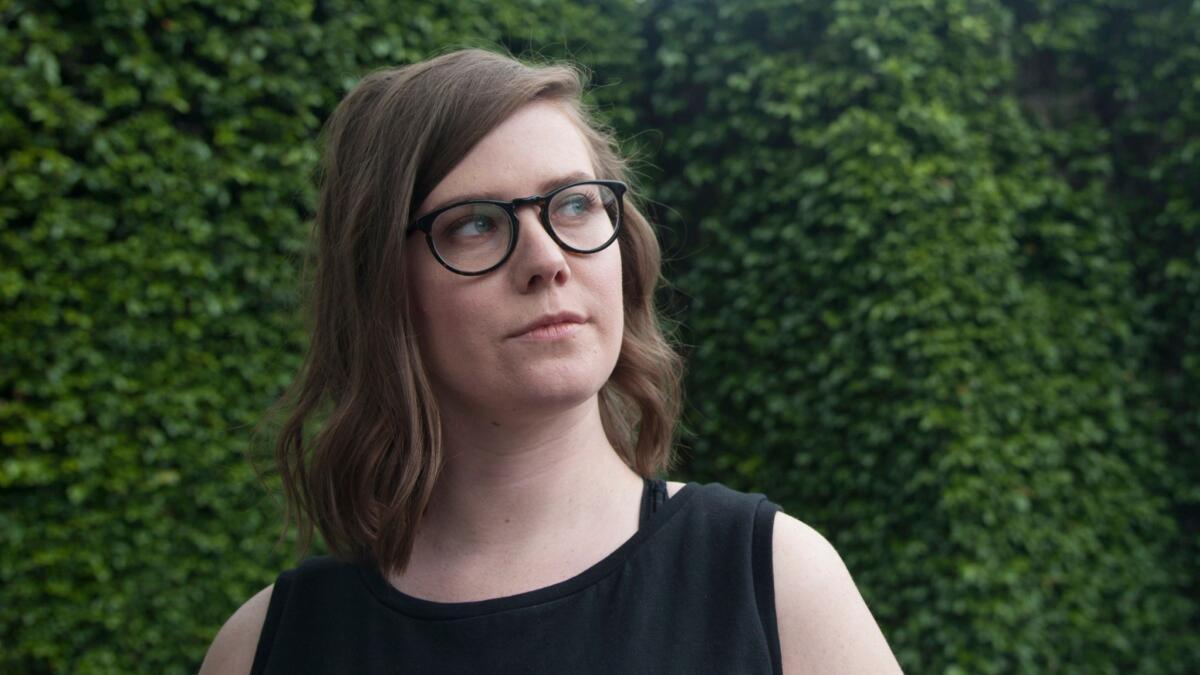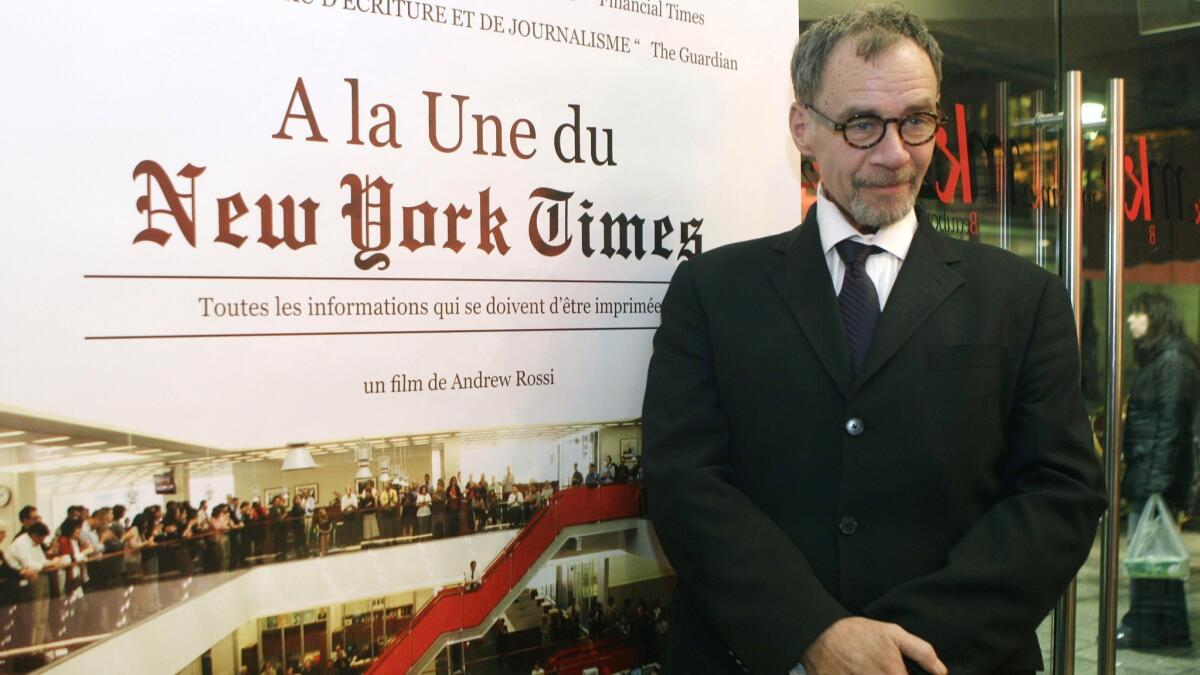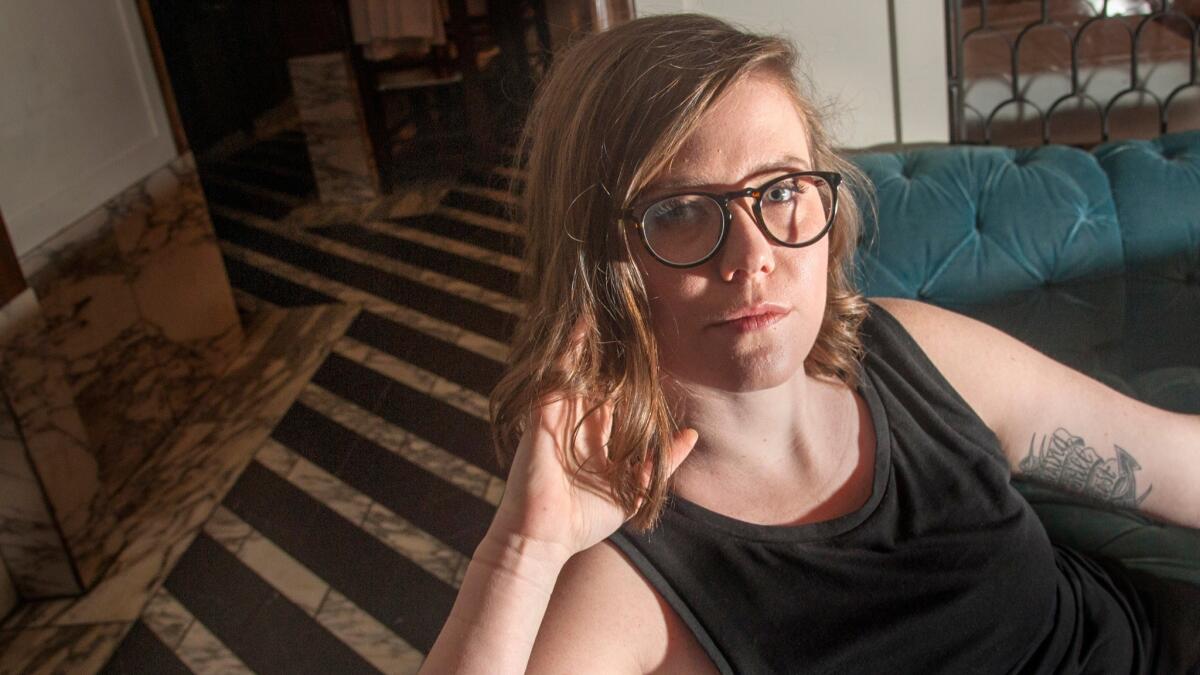How true crime documentaries helped Erin Lee Carr move forward after her father’s death

- Share via
When David Carr died, he left behind 1,946 pieces of digital correspondence with his daughter.
His death had been sudden: In 2015, he collapsed in the newsroom of the New York Times, where he served as the paper’s renowned media columnist. An autopsy would later reveal he had lung cancer; he was 58.
And so in the wake of her father’s unexpected death, Erin Lee Carr clung to every email, each G-chat they’d exchanged. She saw in him the same demons that plagued her — the call to alcohol and drugs, an unbridled need to achieve that he once described to her as a kind of birthright: “You are a Carr, and that is a complicated, wondrous inheritance. That means you are tough, you are smart, you are someone others want to be around. But it also means that mistakes of hubris, excess, and indulgence will stalk you.”
When he died, she was 26, in the early stages of a documentary filmmaking career that he had helped her launch. He’d long been eager to help her find success, and she did not eschew his guidance.
He connected her with industry contacts he’d interviewed, like Shane Smith, the former CEO of Vice — the company where she’d go on to land her first job. He spruced up a pitch letter she’d written to Judd Apatow, tossing in some of his distinctive prose. And after she was fired from Vox Media, he reached out to Andrew Rossi — the filmmaker who’d trained his lens on the journalist in 2011’s “Page One: Inside the New York Times” — asking if the director would have coffee with his kid.

It was a meeting that proved instrumental for Carr, leading her to make four documentaries for HBO. Two of those projects are being released in quick succession: In May, the network aired “At the Heart of Gold: Inside the USA Gymnastics Scandal,” a film she made about the sexual abuse inflicted on dozens of young female athletes by team doctor Larry Nassar. And on Tuesday comes the first in a two-part docuseries, “I Love You, Now Die: The Commonwealth Vs. Michelle Carter,” about a 17-year-old who seemingly encouraged her boyfriend to commit suicide via text message.
Both are coming out on the heels of the April publication of her first book, a memoir about her relationship with her dad called “All That You Leave Behind.” The confluence of events has led to a flurry of attention for Carr, now 31, and interviews on NPR’s “Fresh Air” with Terry Gross and “Armchair Expert,” the popular podcast hosted by Dax Shepard — the kind of recognition her dad knew well, something he simultaneously pushed her toward and cautioned her against.
“As soon as you figure out the job, or the case, or the story, there will be another,” he wrote in an 2014 email to Carr that she shares in her book. “The reward for achievement is a hunger for more, a blessing that lives inside a curse.”
That’s exactly what the Brooklyn-based Carr was grappling with on a recent trip to Los Angeles, a day after sitting opposite Shepard in his famous attic.
“All this stuff is happening, but I’m feeling fearful about it going away,” she admitted. “It’s about balancing the deep ambition that my father instilled in me — but I think was also what led to his death. This extremism of cigarettes and coffee and not sleeping. He died when he was 58. That’s not something I want for myself.”
It was a hazy spring morning, and Carr was drinking coffee, wearing the same kind of round, black-rimmed eyeglasses her dad often sported. She had on a tank top, making the tattoos on her arms visible. In a few hours, she’d head back to the airport, one of the few places she finds still tests her sobriety because of the “cornucopia of alcohol” for offer in the lounge.

In his own memoir, Carr’s father revealed the depths of his addiction — he was a crackhead, and when Erin and her twin sister were just months old, he left them alone in a freezing car for two hours while he went off in search of a score. So when Carr began drinking too much in her early twenties, she sought her dad’s help in 12-stepping her through Alcoholics Anonymous. She’s been sober for three and a half years and attributes her work ethic in part to being clean.
“If you look at the amount of films I’ve made in the last couple of years, I don’t have a peer that’s done that, and that’s because I’m sober,” she said. “At night, I keep working or watch … TV.”
But she has also been a diligent student of the genre. When Carr first sat with Rossi in 2013, she had made two short films for Vice — projects he was a fan of. She was up for a gig as the head of video at Cosmopolitan, but the director urged her to consider making her own films instead.
“She has a real emotional intelligence and a sort of savvy about how the market works,” said Rossi. “I think directors need to have a connection to a subject and the courage to put themselves on the line. Those are things you don’t necessarily need a PhD in — they’re instinctive. You don’t have to be 40 years old to be a director.”
So Rossi set up a meeting with Sheila Nevins, then the head of documentary film at HBO. Carr was scared. She’d heard tales of how “incredible and revered and out there” the executive was. And within minutes of pitching her first idea to Nevins — about Silk Road founder Ross Ulbricht — she was shot down.
“She was like, ‘That’s boring! I don’t like that! It smells like gasoline in here!’ ” Carr remembered, laughing.
But she didn’t want to lose her shot with Nevins, so she kept bringing up ideas. Eventually, Nevins bit: She was interested in the story of the so-called Cannibal Cop, a New York City police officer accused of conspiracy to kidnap, rape, torture and eat women.
Nevins, not one to mince words, acknowledged she was not initially impressed by Carr and said she “did pick up on the fact that Erin had an easily intimidated side.”
“I guess I have that effect on young women,” Nevins said in a phone call. “To me, she was a young filmmaker, and I thought her idea was horrible. I do remember being excited to meet her and not knowing much about her work. I had a repertoire of seasoned people, and it was time to break out of the mold. She was young and ambitious and aggressive. I was curious. I thought, how big can she grow?”
I’ve heard good things about it, and they got incredible actors to do it. But I’m close to the family, and it’s painful for them.
— Erin Lee Carr
With a development deal in hand, Carr set out to make “Thought Crimes: The Case of the Cannibal Cop,” which was released in 2015. Every night, she watched documentaries “compulsively” — films like “Capturing the Friedmans” and “There’s Something Wrong with Aunt Diane” to gather a better understanding of the genre. She started keeping a Google Doc to track the mistakes she made on set and learn from them: Check if the cinematographer has extra batteries. Always have a spare hard drive with you. When you are done interviewing a subject, it’s time to get them to sign a release.
She also kept in mind a lesson from her father: Approach the craft like a journalist would, finding a beat, sticking to it and eventually excelling in it.
Her follow-up film, 2017’s “Mommy Dead and Dearest,” would further establish her niche in the true crime genre. The film told the story of Gypsy Rose Blanchard, who was convicted of conspiring to kill her mother after years of being the victim of Munchausen syndrome by proxy. The case gained further notoriety this year when, in March, Hulu released “The Act,” a critically acclaimed fictionalized version of the story starring Patricia Arquette and Joey King.
Carr has no interest in watching “The Act” and is conflicted about the project’s existence.
“I spent my life figuring this out, and then somebody fictionalized it without the family’s consent,” she said. “I’ve heard good things about it, and they got incredible actors to do it. But I’m close to the family, and it’s painful for them.”
Carr said she likes true crime tales because she is interested in “demystifying motives” — exploring culpability and holding power to account. She often mines for ideas in People magazine and on Reddit threads, seeking layered stories that often have to do with complicated women. Rossi, who has produced three of Carr’s films, described her as having a strong radar that allows her to know which stories will “push the right buttons and penetrate the noise.”
“I think that what I bring to a table — and how I pitch people now — is I will give you an empathetic portrait, a human rendering of something really terrible that happened,” she explained. “I will look at it from all sides, and it will feel nonjudgmental. I think that so often filmmakers have such a point of view, but with my films, I don’t know if you can really tell what I think.”
With Carr’s latest, “I Love You, Now Die,” Nevins said she was impressed with how her protégée uncovered the human side of a young woman she expected to hate.
“I’d thought Michelle Carter forced her boyfriend to kill himself in his truck. And there are very few filmmakers who would have gone so deep to find an abused kid and not the murderous villain who was portrayed in the press,” said Nevins, who is now leading MTV’s nascent documentary division. “Erin finds something in these very strange, difficult people that is enormously human and compelling. She has a way of knowing we’re all in it together, drunk or sober, evil or good. She’s not without sorrow. She’s not without evil thoughts. And that’s helped her understand those emotions.”
Nevins joked that she no longer intimidates Carr — instead, the young upstart scares her, mostly because she now has the ability to work with other top executives.
“She was, like, so accessible and now I have to court her,” Nevins lamented. “She’s very loyal, but she wants to work. She wants to have an apartment.”
Carr said she’s trying to overcome what she calls her “scarcity complex” — saying yes to everything she’s offered because she’s worried each job may be her last. She’s been pitched some biopics on comedians, and friends wonder why she doesn’t want to tackle something lighter, but she said she’s committed to becoming “the best possible director” in the true crime space. But if she wants to avoid her dad’s fate, she knows she needs to be mindful of her health — going to the doctor when she says she will instead of blowing off the appointment for a shoot.
“One time, my dad asked me: ‘What if you become more successful than me?’ And I was like, ‘I hope so!’ ” Carr said. “I think he was joking, but he was somewhat serious. Do I want to be equal to or surpass my dad, or is that a delusion? What is the ambition for?”
“With the gymnastics documentary,” she continued, “I got one review that was a little tough. And one of the subjects told me: ‘I’m in it. I suffered abuse and you helped me. Isn’t that what matters?’ She set me straight in this moment of ego. And I was like, ‘Yes, that’s what matters. Connecting with others as a result of work.’ That is the privilege.
“Yes, I’m interested in money ... but is that really gonna impact my soul? I print out some of those emails and hang them in my office, because this is how I’ll get better. Just in the way that I used to print out my dad’s emails.”
Follow me on Twitter @AmyKinLA
More to Read
Only good movies
Get the Indie Focus newsletter, Mark Olsen's weekly guide to the world of cinema.
You may occasionally receive promotional content from the Los Angeles Times.











